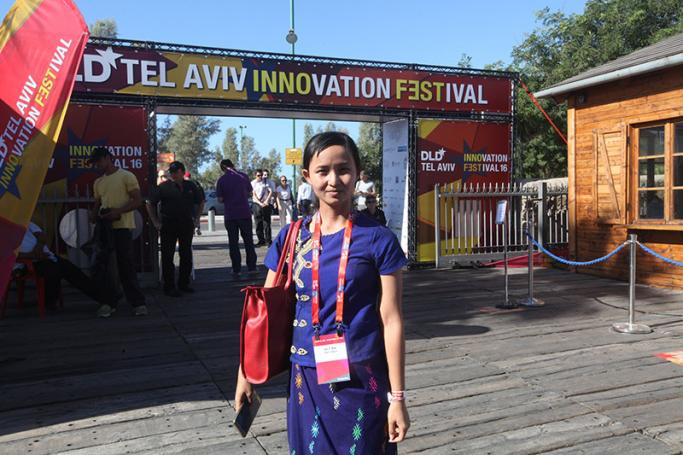Myanmar’s tech startup representative says she has learnt a lot from an Israeli technology exhibition that is open to people trying to create technological advances and start up new tech enterprises.
Ms Lei Yi Soe was speaking at the opening of the DLD Tel Aviv Innovation Festival 2016 opening on September 27 in Tel Aviv, an exhibition of world technology and entrepreneurship with representatives attending from around the world.
Over the years, Israel has developed into a hub of tech innovation. Ms Lei Yi Soe represented Myanmar at the competition that this year celebrated women’s entrepreneurship around the world with this year all the competition participants being women.
According to the organisers, this highlights another important aspect of Tel Aviv's startup scene: the city's ecosystem is a leader in gender equality and has been ranked the number one hub for women entrepreneurs outside the United States. According to the Compass report, Tel Aviv has 20 percent women founders in startups, while the European average is 17 percent.
The event included new startups as well as world players such as Samsung, Microsoft and Intel from 32 countries.
Most of startup companies are exhibiting their new products such as robots, drones, cyber security, virtual reality products and many kind of social security software.
The event included the 33 winners of the startup competition, including Ms Lei Yi Soe, who won the Myanmar prize for a software system developed for the garment industry.
Ms Lei Yi Soe said“I have seen and learnt many different new technologies at the DLD exhibition, and it was so much interesting for me.”
The control of drones was particularly inspiring.
“At the all tech exhibition the most interesting for me is the drone made by Intel, people can control the drone by their moving hand, no need for a controller, just moving hand and you can give commands to the drone,” she said.
“When I go back to Myanmar I will to tell my experience to my Myanmar friends who interested in startups,”Ms Lei Yi Soe said. “I want to share my knowledge from what I have learnt and seen at DLD exhibition, for the start I would like to young people to communicate with some people from DLD, so that next time they will have the chance to do a startup like me.”
As one Intel representative said, they are showing dozens of technologies from all around the world.
“You can see virtual reality, you can see the internet of things, you can see here very cool stuff,” said Mr Ghy Grimland, a PR representative with Intel.
He said the big change was the transition from a PC-based culture to one more based in the cloud and the internet of things where “everything is smart and connects.” What was achieved in a PC before is now available in a variety of ways, such as smart cars and virtual reality.
“Intel can solve many problems and we operate around the world and so I think we are giving people around the world the way to communicate, the way to compute things, the way to have technology help them in their daily lives,” said Mr Grimland, adding that this can be used in education, health, sport and a range of areas to improve people’s lives.
As one Israeli rep said, female entrepreneurship is something close to her heart. “This is the place to start when you are young, fresh and have crazy ideas,” said Ms Moran Shaked, the leader of the international startups group, noting that “this is the time to really change the world.”
“This is the time to go for it, it is a win-win for all,” she said.
When asked about the importance of startups in a developing country like Myanmar, she said that with startups “these are the crazy ones, like Steve Jobs, these are the ones who really can change and really want to change the world,” Ms Shaked said.
“They are early adopters, they know what is going on the world, they are the ones who see twenty years ahead, and they know what to bring, when it comes to developing countries, so they are the ones so like with a simple farmer or a simple employee to make their life better,” she said.
At the end of the day, we want technology to work for us, to make our life better, she said.
Mizzima asked what the challenges are for women to get involved in the startup and technology field.
“I think startups are challenging for men and women, both, but we need to ask ourselves, how come we don’t see so many women around, and I think and it has something to do with the fact that women are the only one who can give birth and there is a lot of conflict when it comes to motherhood and career. It’s a global debate,” she said.
One representative from Holland told Mizzima that his presence represented cooperation between Holland and Israel in robotics. MrArie Van Den Ende, founder and advisor to Robo Valley lauded the Amazon Robotics challenge which was helping young companies in the tech development field.
You are viewing the old site.
Please update your bookmark to https://eng.mizzima.com.
Mizzima Weekly Magazine Issue...
14 December 2023
Spring Revolution Daily News f...
13 December 2023
New UK Burma sanctions welcome...
13 December 2023
Spring Revolution Daily News f...
12 December 2023
Spring Revolution Daily News f...
11 December 2023
Spring Revolution Daily News f...
08 December 2023
Spring Revolution Daily News f...
07 December 2023
Diaspora journalists increasin...
07 December 2023
Euromoney Myanmar Global Investment Forum begins in Nay Pyi Taw












